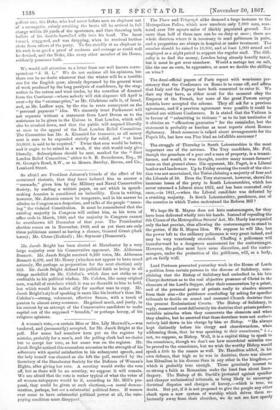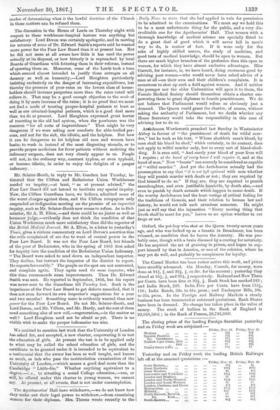Lord Portman presented yesterday week in the House of Lords
a petition from certain persons in the diocese of Salisbury, com- plaining that the Bishop of Salisbury had embodied in his late Charge doctrines as to the real objective presence of Christ in the elements of the Lord's Supper, after their consecration by a priest, and of the personal power of priests really to absolve sinners from their sins—the petitioner concluding by asking for speedier tribunals to decide on sound and unsound Church doctrine than the present Ecclesiastical Courts. The Bishop of Salisbury, in reply, reasserted most deliberately his doctrine that priests perform invisible miracles when they consecrate the elements and when they absolve, but he asserted that these doctrines were not authori- tatively laid down in his charge by him as Bishop. "He always kept distinctly before his clergy and churchwardens, when addressing them, that he was speaking to their consciences," i. e., not, we suppose, as Bishop. Well, it is a capital thing to speak to the conscience, though we don't see how sacerdotal miracles can be proved to the conscience, but we wish the worthy Bishop would speak a little to the reason as well. Dr. Hamilton added, in his own defence, that high as he was in doctrine, there was almost less Ritualism in his diocese than in any other in the kingdom,— which is probably true enough. Those genuinely nearest to so strong a faith as Romanism make the least fuss about linen- drapery. The Bishop of St. David's protested against speedier and cheaper ecclesiastical tribunals, as being likely to encourage doctrinal disputes and charges of heresy,—which is true, no doubt. But yet, if it is not proposed to give the people any other check upon a new system of worship which drives them re- luctantly away from their churches, we do not see how speedy
modes of determining what is the lawful doctrine of the in these matters can be refused them.



































 Previous page
Previous page